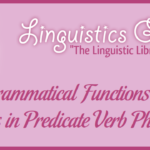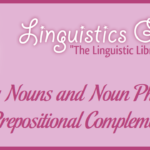A clause in English grammar is defined as a grammatical structure that contains both a subject and a predicate. The subject always precedes the predicate in declarative sentences. However, the form of the predicate varies depending on the clause. The six forms of the predicate in English grammar are:
- Subject – Verb
- Subject – Verb – Verb Phrase Complement
- Subject – Verb – Subject Complement
- Subject – Verb – Direct Object
- Subject – Verb – Direct Object – Object Complement
- Subject – Verb – Indirect Object – Direct Object
Learning about the six forms of the predicate in English grammar is important for understanding the syntax, or word order, of the English language.
Subject – Verb
The first form of the predicate in English is the Subject – Verb (SV) clause. The predicate of an SV clause contains only a verb phrase functioning as a predicate. For example, the following sentences are examples of Verb predicates:
- Subject | Verb
- I | am.
- My husband | writes.
- Poppy | is sleeping
- The truck of gas | has exploded.
- The carrots in my garden | have been eaten.
- His sister | might be visiting.
Sentences with only a subject and a verb are the most basic simple sentences in English.
Subject – Verb – Verb Phrase Complement
The second form of the predicate in English is the Subject – Verb – Verb Phrase Complement (SV VPComp) clause. The predicate of an SV VP Comp clause contains a verb phrase and a verb phrase complement in the form of a prepositional phrase. For example, the following sentences are examples of Verb – Verb Phrase Complement predicates:
- Subject | Verb | Verb Phrase Complement
- My daughter | argued | about washing the dishes.
- The neighbors | are listening | to terrible music.
- Our favorite professor | objects | to censorship.
- You | should have apologized | for running over my Aunt Betty.
- My parents | were looking | at my cellphone bill.
- Our landlord | will agree | to a reduced rent payment.
Verbs followed by prepositional phrases functioning as verb phrase complements are called prepositional verbs. The verb phrase complement always directly follows the head of the verb phrase.
Subject – Verb – Subject Complement
The third form of the predicate in English is the Subject – Verb – Subject Complement (SV SubComp) clause. The predicate of an SV SubComp clause contains a verb phrase and a subject complement. A subject complement is a word, phrase, or clause that follows a copular, or linking, verb and describes the subject of a clause. For example, the following sentences are examples of Verb – Subject Complement predicates:
- Subject | Verb | Subject Complement
- My favorite subject | is | grammar.
- This apple | tastes | very sour.
- That recipe | seems | rather difficult.
- The darkest time of the night | is | after midnight.
- Her favorite hobby | was | gardening vegetables.
- Your guest | can be | whomever you want to bring.
Subject – Verb – Direct Object
The fourth form of the predicate in English is the Subject – Verb – Direct Object clause. The predicate of an (SV DO) clause contains a verb phrase and a direct object. A direct object is a word, phrase, or clause that follows and receives the action of a mono-transitive verb. For example, the following sentences are examples of Verb – Direct Object predicates:
- Subject | Verb | Direct Object
- Shawn and Gus | played | soccer.
- Juliet | bought | contact lenses.
- The girl | was eating | some fruit.
- Christine | has discovered | a pile of rare books.
- My mom | cleaned | my bedroom closet.
- I | admire | how you work full time and attend graduate school.
Subject – Verb – Direct Object – Object Complement
The fifth form of the predicate in English is the Subject – Verb – Direct Object – Object Complement clause. A predicate of a Subject – Verb – Direct Object – Object Complement clause contains a verb phrase, a direct object, and an object complement. An object complement is a word, phrase, or clause that directly follows and describes or completes the direct object. For example, the following sentences are examples of Verb – Direct Object – Object Complement predicates:
- Subject | Verb | Direct Object | Object Complement
- The American people | elected | John F. Kennedy president.
- I | will paint | my bathroom ceiling | crimson red.
- Christians, Jews, and Muslims | consider | Jerusalem | holy.
- The evidence | has proven | the accused man | innocent.
- Children | declare | the best time of year | during the summer.
- Most critics | consider | one theme of the story | what you wrote about in your final paragraph.
The object complement always follows the direct object in English grammar.
Subject – Verb – Indirect Object – Direct Object
The sixth form of the predicate in English is the Subject – Verb – Indirect Object – Direct Object (SV IO DO) clause. A predicate of an SV IO DO clause contains a verb phrase, an indirect object, and a direct object. An indirect object is a word, phrase, or clause that indicates to or for whom or what the action of a ditransitive verb is performed. For example, the following sentences are examples of Verb – Indirect Object – Direct Object predicates:
- Subject | Verb | Indirect Object | Direct Object
- My husband | gave | the cat | a bath.
- I | will be sending | my mom | a birthday present.
- He | stole | me | a banana.
- You | should give | above the refrigerator | a good scrubbing.
- I | had not given | preparing dinner | any thought.
- The teacher | gave | that all his students failed the test | some serious reflection.
The indirect object always precedes the direct object in English grammar.
Adverbials
Although many sentences in English also contain adverbials (adjunct, disjunct, conjunct), these three grammatical structures are not part of the verb phrase. Adverbials are therefore not included in the descriptions of the forms of English predicates.
Clauses are defined as grammatical structures that contain both a subject and a predicate. The form of the predicate varies depending on the clause, with six forms possible in English grammar.
For more information about the verb phrase that functions as the predicate in English grammar, see Grammatical Functions of Verbs in Predicate Verb Phrases.
Summary
Predicates in English grammar are words or phrases that express the action performed by the grammatical subject or the state of the grammatical subject.
Predicate is a grammatical function.
The grammatical form that can function as the predicate in English grammar is the verb phrase.
The predicate is the head of the main clause.
Other grammatical functions that appear in the verb phrase of the predicate include progressives, perfects, passives, modals, and operators. Other constituents of the predicate include subject complements, direct object, object complements, indirect objects, and verb phrase complements.
References
Brinton, Laurel J. & Donna M. Brinton. 2010. The linguistic structure of Modern English, 2nd edn. Amsterdam: John Benjamins Publishing Company.
DeCarrico, Jeanette S. 2000. The structure of English: Studies in form and function for language teaching. Ann Arbor, MI: The University of Michigan Press.
Hopper, Paul J. 1999. A short course in grammar. New York: W. W. Norton & Company.
Huddleston, Rodney. 1984. Introduction to the grammar of English. Cambridge: Cambridge University Press.
Jacobs, Roderick A. 1995. English syntax: A grammar for English language professionals. New York: Oxford University Press.
Justice, Laura M. & Helen K.Ezell. 2002. The syntax handbook: Everything you learned about syntax…but forgot. Eau Claire, WI: Thinking Publications.
O’Dwyer, Bernard T. 2000. Modern English structures: Form, function, and position. Peterborough, Ontario: Broadview Press.



